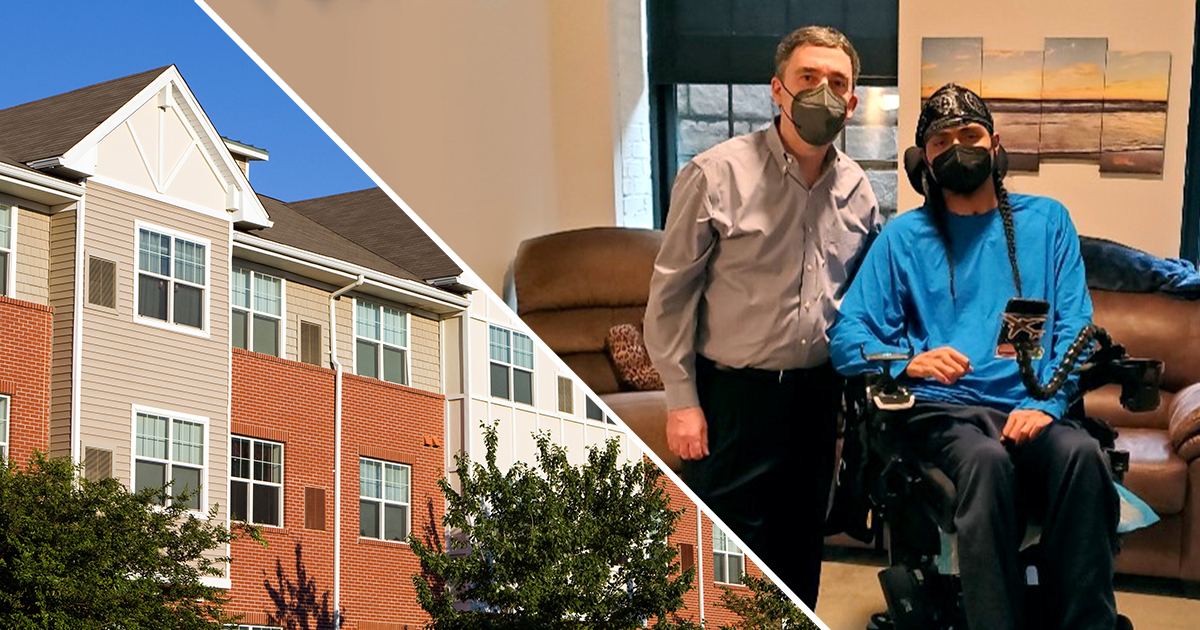An estimated 18 million people with disabilities living in the United States are eligible for federal housing assistance, but do not receive it. Due to low wages and lack of accessible housing options, renters with disabilities are often priced out of their local housing markets, or are moderately or severely cost-burdened if they do have housing. The Money Follows the Person (MFP) demonstration, administered by the Centers for Medicare & Medicaid Services (CMS), was established in 2005 to ensure people with disabilities who need long-term services and supports can receive them in the setting of their choice. The MFP Demonstration is intended to enable grantees—including 41 state and territory Medicaid offices—to experiment and evaluate how new ideas help people with disabilities move to, and remain in, their communities. This includes bolstering home- and community-based services and helping people who choose to move out of institutional settings to secure community-based housing.
In the nearly 20 years since the launch of MFP, obtaining affordable and accessible housing has been one of the biggest barriers to successfully supporting the transitions of people from institutional settings to the community. Sharing lessons learned from these experiences benefits MFP grantees and their local housing partners as they continue work to address this long-standing issue.
MFP grantees can accelerate their progress by learning about and adapting housing solutions other MFP grantees have developed
As part of their MFP program, the state of New Jersey launched the Money Follows the Person Housing Partnership Program (MFPHPP) in 2015. The program addresses challenges MFP grantees often face in achieving buy-in from housing developers and landlords for building accessible units and leasing to MFP participants. This unique partnership between the New Jersey MFP Program, the Housing and Mortgage Finance Agency (HMFA), and N.J. Department of Human Services provides subsidies of up to $150,000 per unit, for up to five one-bedroom units, to housing developers who set aside units for people transitioning out of nursing facilities. After construction begins, MFPHPP monitors the units to confirm they meet requirements and works with property managers to house participants. HMFA also attaches U.S. Department of Housing and Urban Development (HUD) 811 project-based vouchers—federal housing subsidies for adults with disabilities and low income—to these units. The subsidies these vouchers provide makes partnership with HUD viable financially for developers, while ensuring affordability for MFP participants. The partnership works: to date, MFPHPP has approved 97 one-bedroom, accessible apartments for MFP participants, 39 of which are completed and leased to MFP participants. This represents an investment by the state of New Jersey of nearly $8.3 million saved by the MFP program’s transition of participants out of more expensive institutional care settings, and directly translating those savings into affordable and accessible housing in the community for MFP participants.
After hearing about MFPHPP in passing from a state housing agency colleague, the Texas MFP program reached out to New Jersey in 2017 to learn more. This initial conversation paved the way for multiple conference calls over several years to discuss the program and its potential to address housing development challenges in Texas. Inspired by MFPHPP’s success, the Texas MFP program ultimately launched a similar housing partnership in 2020 with technical assistance from the New Jersey team. The Affordable Housing Partnership program features a collaboration between the Texas Health and Human Services Commission, Texas’ quasi-governmental state housing finance agency, and the Texas state housing agency. The program currently operates in four counties in the state and has resulted in 31 planned units reserved for MFP participants, which provides a much-needed increase in the availability of affordable housing for these individuals. The Texas MFP program reported that the Affordable Housing Partnership program’s success in coordinating the roles and responsibilities of these three typically siloed agencies is a critical step toward addressing Texas’ housing challenges in the future.
Avenues for collaboration and peer-to-peer learning can be critical to tackle long-standing, structural challenges
The benefits and importance of fostering peer learning around common challenges like housing are evident from the experiences in New Jersey and Texas. To support sharing around housing challenges and innovative solutions, CMS and Mathematica conducted a year-long housing learning collaborative. During virtual sessions, grantees described their approaches to developing optimal staffing models, building and maintaining successful partnerships with housing authorities, modifying existing homes to increase accessibility, and incorporating successful MFP practices into state Medicaid policies.
The participants valued the ability to share and ask questions of one another. To continue the momentum, participants suggested creating an online forum to allow MFP project directors and other team members to share ideas and challenges and iterate on solutions. Other ideas included pairing newer MFP programs with teams from more established programs to provide direct mentorship and conducting smaller peer groups to connect programs with similar sizes, geographies, populations of interest, or funding structures.
The extension of the MFP Demonstration through September 2027 and recent CMS flexibilities around financing direct housing supports through Section 1115 demonstration programs create more opportunities to help improve housing access for people with disabilities. Initiatives that support collaborative learning among MFP grantees will help them transfer their experience and knowledge to others, multiplying the impact of solutions that work in their states and maximizing each grantee’s potential to identify affordable and accessible housing units for their participants.





